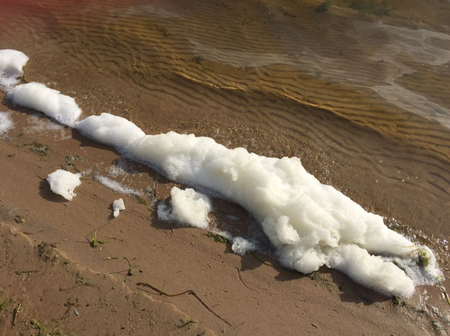Michigan’s Top Environmental Regulator Defends New PFAS Standards, Line 5 Permits
Michigan Department of Environment, Great Lakes, and Energy Director Liesl Clark is pushing back against criticism from corporations and environmentalists alike.

Michigan’s top environmental regulator is defending Michigan’s new standards for PFAS contamination in water. Those chemicals are linked to serious health problems, including cancer, reproductive health and developmental complications.
MichMash hosts Jake Neher and Cheyna Roth talk with Michigan Department of Environment, Great Lakes, and Energy (EGLE) Director Liesl Clark about a recent lawsuit filed by chemical manufacturing giant 3M, which claims the new, stricter standards were created using a “rushed and invalid regulatory process.”
Subscribe to MichMash on iTunes, Spotify, Google Podcasts, NPR One or wherever you get your podcasts.
“It certainly wasn’t a rushed and invalidated process. It was a methodical process,” says Clark. “It is important to move with urgency.”
“The governor asked the department about 18 months ago now to take a look at what the next steps [that] were necessary under a statutory structure to put that in place for the state. And it went through the regulatory structure with every checkbox in the appropriate steps,” she continues. “Is there urgency? Absolutely. Am I proud of the work that we did? I certainly am.”

EGLE calls the new regulations the “nation’s most comprehensive regulations limiting PFAS contamination in drinking water.”
The new regulations limit seven different PFAS chemicals in municipal drinking water. You can find those standards here.
The Environmental Protection Agency (EPA) does not regulate PFAS in drinking water on a federal level. Instead, it has set health advisory levels at 70 parts per trillion.
Environmental groups have criticized that guidance, saying the number is too high to protect people from significant PFAS exposure and lacks regulatory teeth.
That has left Michigan with a regulatory gap to fill when it comes to PFAS chemicals.
“That’s one of the reasons why it was important for us — because we take public health seriously — to step out in front of it on our own from a Michigan perspective,” says Clark. “So we are continuing to work with EPA and trying to understand what steps might they take in the future, and also work with other states.”
“Permits are not about anybody’s opinion. Permits are about what is actually filed with us. And then what is in [the] statute in terms of how do we respond.” –Liesl Clark, Michigan Department of Environment, Great Lakes, and Energy (EGLE)
EGLE has faced criticism from some environmentalists recently for approving permits sought by Enbridge Energy to build a tunnel under the lake bed in the Straits of Mackinac to replace the Canadian company’s controversial Line 5 oil and gas pipeline. Environmentalists generally oppose the project to replace Line 5 in a buried tunnel because they say it represents a significant new investment in fossil fuels, and could allow the current 67-year-old pipeline to continue to operate for years while the tunnel is being constructed. Activists want the pipeline shut down completely, which is what the Whitmer administration is pursuing.
Clark says the decision to approve those permits should not be interpreted as a political position or opinion on the part of her department.
“Those permits were issued based on the statutory constraints that permits are issued under,” says Clark. “Permits are not about anybody’s opinion, permits are about what is actually filed with us. And then what is in [the] statute in terms of how do we respond. And so that’s the work that we do. It’s fairly cut and dry, frankly, and perhaps maybe even a little bit boring from some respects.”
“Our role, really, was looking at the wetlands and the water discharge. We are agnostic as to why the permits are being sought. That’s not a question that we can ask, if that makes sense, based on statute,” she continues.
More from MichMash:
Future of Line 5 Uncertain After Enbridge Ignores Whitmer’s Order to Shut Down
Redistricting Commission Needs Michigan Residents’ Help To Define “Community of Interest”
State’s Approach to Unemployment Lawsuit Puts Victims in Limbo
Michigan Needs To Grow Faster. How Can We Attract More People?
Trusted, accurate, up-to-date
WDET is here to keep you informed on essential information, news and resources related to COVID-19.
This is a stressful, insecure time for many. So it’s more important than ever for you, our listeners and readers, who are able to donate to keep supporting WDET’s mission. Please make a gift today.

